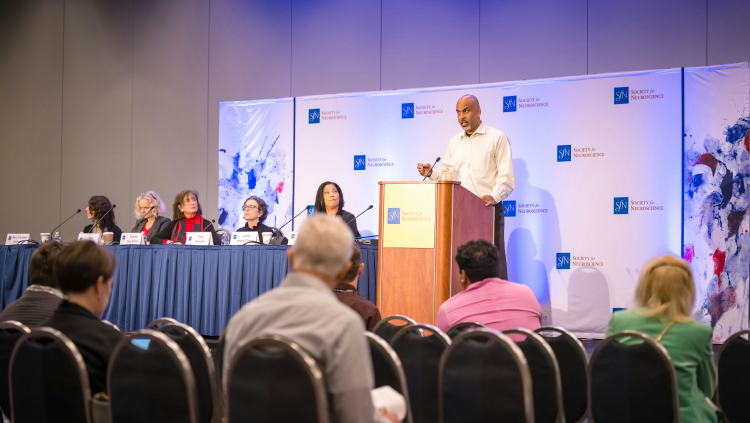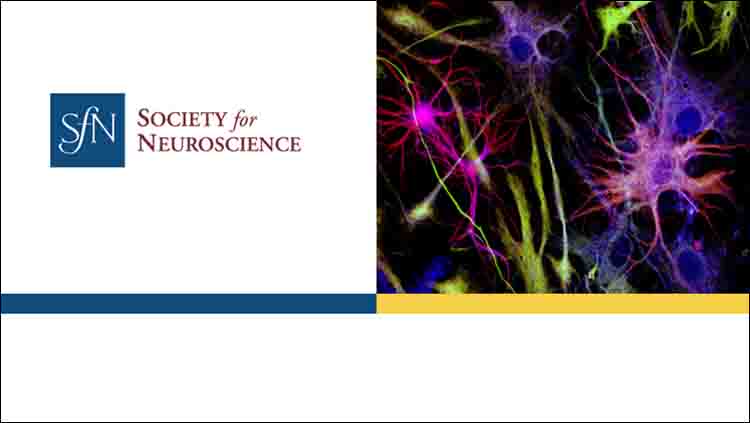Future of Neuroscience: Laura Hawley
“Future of Neuroscience” is a series of interviews with rising members of the field. A forward-looking complement to SfN’s “History of Neuroscience” autobiographies of distinguished researchers, interviewees reflect on their emerging careers and share thoughts on where they believe neuroscience is headed.

Laura Hawley
Laura Hawley is a PhD student at Indiana University – Purdue University, Indianapolis (IUPUI). During various periods of her life, she has played concert piano, enjoyed mountain climbing, worked in business operations and human resources, auditioned for a role on Broadway, competed in horseback riding events, kissed a sea lion, and taught classes in etiquette and decorum. She currently works in a genetics laboratory studying neonatal molecular and neurobehavior development in a mouse model of Down syndrome. She enjoys engaging in “nature vs. nurture” debates with her husband, a clinical psychologist, and struggles to remember basic math when helping her two kids with their homework. Laura is a vociferous advocate of normalizing conversations about mental health and the benefits of a good therapist. She has received awards for her scholarly and research pursuits including IUPUI’s Elite 50 Award, Outstanding Doctoral Research Award, Elizabeth Steele Creveling Memorial Award, and the SfN Trainee Professional Development Award (TPDA).
Neuroscience Quarterly (NQ): How did you know you wanted to pursue a career in neuroscience?
Laura Hawley (LH): During my senior year in college, I was selected to start a project in La Paz, Bolivia, investigating how to improve pregnancy rates of llamas. I had worked with llamas and alpacas at the school farm for almost two years, and when I had these experiences, I finally realized what I wanted to do for the rest of my life: animal research. I received my bachelor’s degree in animal science in 2003, emphasizing in large animal reproduction, and had every intention of going to graduate school.
However, as I was about to graduate, I was diagnosed with major depressive disorder and generalized anxiety disorder with acute panic attacks, and I decided to take a gap year to work on my mental health. One year turned into several, I met my husband, got a job, and accidentally became an adult. Graduate school was always in the back of my mind, but it kept getting further away as we had our children and moved around the country as my husband completed his education.
One year turned into several, I met my husband, got a job, and accidentally became an adult.
I was a stay-at-home mom for several years and as my kids grew, I started to notice differences between when each of them met their developmental milestones. My son has since been diagnosed with autism, but at the time I was desperate to understand how to help him. As I started researching neurodevelopment, the spark of how much I loved my undergraduate research in embryogenesis was rekindled. My husband had always encouraged me to go back to school and this was the nudge I needed to figure out how to get there. It wasn’t that I disliked being a mom, but I realized I was missing the intellectual stimulation I needed to feel fulfilled and happy.
NQ: You had a 15-year gap between completing your bachelor’s degree and starting your PhD. How were you able to prepare yourself and your family (e.g., mentally, logistically) to go back to school? Can you discuss some of the barriers you faced and how you overcame them?
Learning to balance my roles as a wife, mom, volunteer, graduate student, mentor, teacher, and research scientist still feels like learning how to drink from a firehose.
LH: I was raised in an extremely conservative culture and had set life goals for myself to maintain a loving and well-ordered home, raise and nurture children, and support my husband’s career goals. I had to overcome a lot of guilt about wanting to go to graduate school and truly believe that what I’m doing isn’t selfish. Learning to find my worth within myself has been the hardest part of this whole journey. I am incredibly lucky to have the unconditional support of my husband and kids. They celebrate my successes and make sacrifices for me. I told my husband recently, “I am so sorry you're having to pick up all of these balls I'm dropping,” and he said, “Honey, you're not dropping balls. You’re handing them to me so I can help you. Just tell me what you're still trying to juggle.” Learning to balance my roles as a wife, mom, volunteer, graduate student, mentor, teacher, and research scientist still feels like learning how to drink from a firehose.
NQ: What is your area of research and what drew you to it?
LH: My research focuses on how the triplication of human chromosome 21 contributes to the delays in developmental milestone achievement present in individuals with Down syndrome. Using a mouse model, I study how manipulating gene copy number affects the molecular and neurobehavior phenotypes in neonatal pups during the first three weeks of life. I love what I do, and it’s the hardest thing I’ve ever done. I’m using what I learned from my animal science work as an undergrad and things I learned while watching my kids grow and incorporating them with what I am learning in the molecular genetics laboratory I work in now. Being able to put all three of these together and use it in a real-world application is an incredible and humbling experience.
NQ: In what ways has taking time for motherhood shaped your approach to your research?
LH: Having life experience and being a mom has allowed me to come up with some innovative ideas. Anything involving children rarely goes exactly as planned, and I’m finding the same thing happens in research. There is no one way to do something. For example, I needed some Von Frei hairs for an experiment studying nociception in mice. Buying a set was expensive and we weren’t completely sure the experiment was going to work. I did some digging and found I could easily make my own set using popsicle sticks and fishing wire to use for preliminary testing. It was fortunate we did it this way because we ended up not going in that direction and saved a lot of money.
Being a mom also taught me patience. When an experiment fails, you figure out what went wrong. It is usually the case that the experiment did not fail — it just failed to give you the result you expected. The patience and perseverance needed to get a stubborn three-year-old to eat their carrots is the same energy needed working in a lab.
NQ: How do you see the field of neuroscience changing, and what are some changes you hope to see?
Anything involving children rarely goes exactly as planned, and I’m finding the same thing happens in research.
LH: Having life experience and being a mom has allowed me to come up with some innovative ideas. Anything involving children rarely goes exactly as planned, and I’m finding the same thing happens in research. There is no one way to do something. For example, I needed some Von Frei hairs for an experiment studying nociception in mice. Buying a set was expensive and we weren’t completely sure the experiment was going to work. I did some digging and found I could easily make my own set using popsicle sticks and fishing wire to use for preliminary testing. It was fortunate we did it this way because we ended up not going in that direction and saved a lot of money.
Being a mom also taught me patience. When an experiment fails, you figure out what went wrong. It is usually the case that the experiment did not fail — it just failed to give you the result you expected. The patience and perseverance needed to get a stubborn three-year-old to eat their carrots is the same energy needed working in a lab.
NQ: What advice would you give to mothers or other caregivers who are interested in starting a neuroscience career?
Mothers are good at giving all of themselves to their family and skipping out on the self-care they need. Scientists do the same thing.
LH: The biggest piece of advice that I would give to mothers and caregivers starting this journey is to define your boundaries before you begin. Mothers are good at giving all of themselves to their family and skipping out on the self-care they need. Scientists do the same thing. Giving time to one aspect of my life takes away from others; I can’t be at home playing with my kids and be at the lab running experiments and going on a date with my husband and sitting in a reading chair with a good book all at the same time. Decide how much of “you” to give to each area of your life before you are faced with the choice and find mentors who will help you maintain those boundaries.
There will never be enough time or a right time to go back to school to be a neuroscientist, just like there is never enough time or a right time to become a parent. I was 35 when I started my PhD. It felt impossible before I started. Now, as I’m coming to the end of my degree and looking for my next adventure, I feel empowered. Nothing about this has been easy, but now my daughter says she wants to pursue a PhD in astrophysics, and when my son talks about scientists, he uses she/her pronouns. If nothing else, this is the image I want the next generation to have — it is possible that you can do this.



















